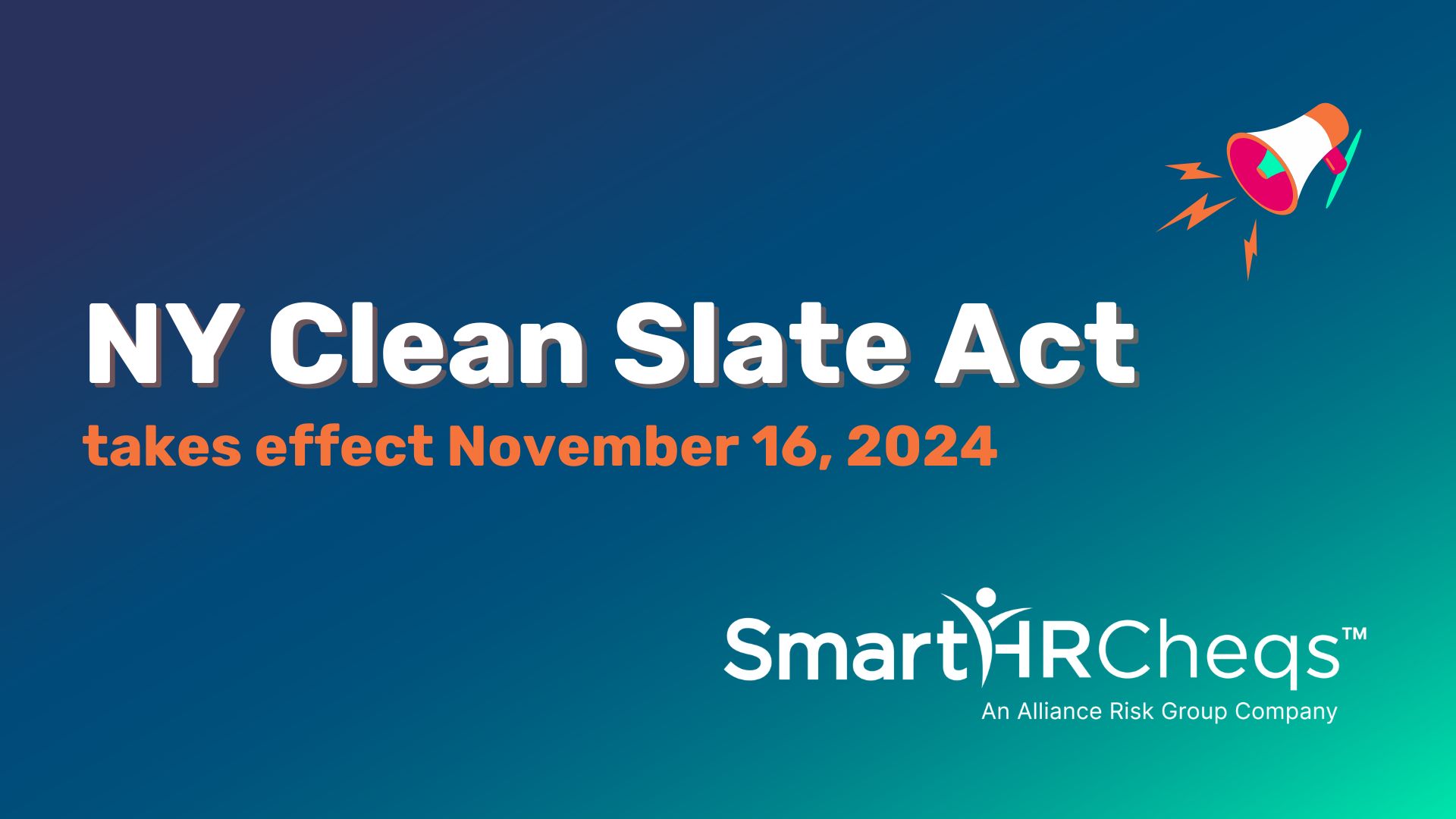Navigating New York State’s Clean Slate Act: A Guide for HR Professionals in Background Screening
New York State’s Clean Slate Act, taking effect on November 16, 2024, introduces automatic sealing for eligible criminal convictions, creating new opportunities for individuals with past convictions while challenging HR professionals to adapt their background screening practices. This landmark law aims to remove employment, housing, and educational barriers by preventing specific past convictions from appearing on standard background checks. Here’s what HR teams need to know to remain compliant, support fair hiring, and make informed decisions.
Key Provisions of the Clean Slate Act
The Clean Slate Act primarily benefits individuals with qualifying criminal records, allowing eligible convictions to be automatically sealed under certain conditions:
- Automatic Sealing of Convictions:
Criminal records for eligible misdemeanors and felonies are automatically sealed after a waiting period—seven years for misdemeanors and ten for felonies—beginning after completing the sentence, including any parole or probation.
- Eligibility Requirements:
The Act excludes severe and serious convictions such as sex offenses, Class A felonies, and violent felonies from automatic sealing. For eligible records, the individual does not need to apply for sealing, which reduces barriers.
- Restricted Access to Sealed Records:
Sealed records will be largely inaccessible for employment purposes, except in specific cases such as law enforcement or certain state agencies. For most employers, these records will no longer be part of background checks, impacting the visibility of a candidate’s complete criminal history.
- Protection Against Discrimination:
New York Human Rights Law prohibits discrimination based on sealed convictions, aligning with the Clean Slate Act’s intent to provide second chances. Employers cannot ask candidates to disclose sealed records, ensuring fairer hiring practices.
How the Act Impacts Background Screening
The Clean Slate Act limits access to certain criminal records, requiring employers to adjust their screening processes. Here’s what it means for HR:
- Reduced Criminal History Access:
Employers will no longer see certain sealed convictions in background checks. HR teams need to understand this change and adapt to screening reports that reflect only available data.
- Compliance and Policy Updates:
HR departments must revise hiring protocols, update job applications, and train staff to avoid questions or practices that may conflict with the Clean Slate Act.
- Emphasis on Fair Chance Hiring:
As records are sealed, fair chance hiring practices become more critical, allowing candidates to be evaluated based on qualifications and fit, rather than past mistakes.
Steps for HR Professionals to Remain Compliant
- Update Background Screening Policies:
Ensure your screening policies are up to date with New York’s new regulations, specifying which types of checks are allowable and removing any questions about sealed records.
- Educate Your Team:
Provide training for hiring managers and recruiters to understand what the Clean Slate Act entails. This will reduce legal risks and ensure your team is aligned on compliance standards.
- Partner with a Knowledgeable Screening Provider:
Partnering with a background screening provider that is well-versed in New York’s Clean Slate Act can help you navigate compliance confidently and ensure a smooth hiring process.
- Communicate Transparently with Candidates:
Adding a note about background screening policies and candidate rights in New York to your applications builds transparency and trust with applicants.
- Use Holistic Screening Approaches:
With certain records sealed, consider implementing additional assessment tools, such as skills testing and reference checks, to gather a comprehensive view of candidates.
Embracing Compliance as a Path to Fair Hiring
Adapting to the Clean Slate Act fosters a culture of inclusion and reflects positively on your organization’s commitment to social responsibility. Compliance with this Act not only fulfills legal obligations but also enhances your organization’s reputation as a fair and progressive employer. Many candidates affected by the Clean Slate Act have been conviction-free for years. By opening doors to these individuals, companies benefit from increased diversity, fresh perspectives, and new skills.
Conclusion
The Clean Slate Act represents a significant change in New York State’s employment landscape, and HR professionals need to stay informed to comply effectively. By understanding the Act’s provisions, updating screening policies, and educating hiring teams, your organization can navigate these changes confidently. The Act’s November 16, 2024, launch presents an ideal time to reevaluate your background screening practices and adopt fair, compliant hiring practices that support both your organization’s needs and the rights of candidates. Embracing these adjustments will help build a safer, more inclusive workplace in line with New York’s evolving employment laws.
For those seeking further assistance, SmartHRCheqs offers compliant, expert-led background screening solutions to support HR professionals in adjusting to these new requirements. Partnering with a background screening provider who understands the nuances of the Clean Slate Act is essential to making informed hiring decisions confidently while meeting compliance obligations.
By staying proactive, HR professionals can turn these regulatory changes into strengths, positioning their organization as a leader in fair, compliant hiring in New York.
Learn more about the NY State’s Clean Slate Act HERE and HERE.
